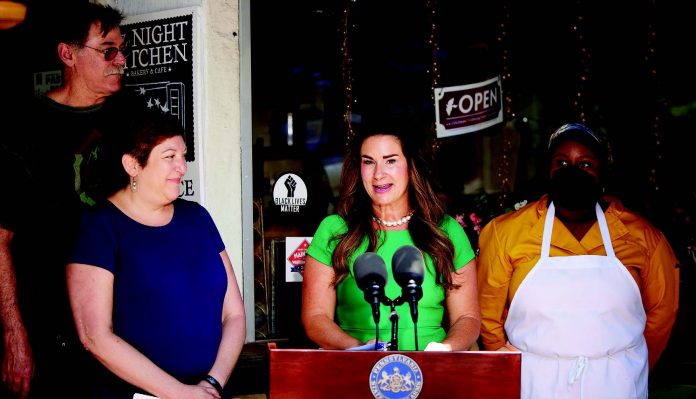PHILADELPHIA, PA, June 9, 2022 – Pennsylvania Department of Labor & Industry (L&I) Secretary Jennifer Berrier continued her statewide push for legislative action to raise Pennsylvania’s appallingly low minimum wage during a visit to Philadelphia’s Night Kitchen Bakery & Cafe, a business that supports Governor Tom Wolf’s proposal to raise the minimum wage to $12 an hour with a pathway to $15 by 2028.
“We are in the City of Brotherly Love, but love is, unfortunately, the last thing we have been showing the thousands of workers still earning the pitiful minimum wage in Pennsylvania of just $7.25 an hour,” said Secretary Berrier. “At Night Kitchen, we are about 11 miles, about a 20- minute drive, from the New Jersey border, where minimum wage workers earn $13 an hour – that is 79 percent more per hour than a comparable worker in Pennsylvania. How is that fair? We are allowing poverty-level pay in exchange for an honest day’s work from some of the most vulnerable people in our labor force. The Wolf Administration supports a plan that ends the legal exploitation of hourly workers and also eliminates the tipped worker minimum wage of $2.83 an hour. We believe one fair minimum wage for all workers helps tipped workers ― two-thirds of whom are women.”
Governor Wolf’s plan would raise Pennsylvania’s minimum wage to $12 per hour by July 1, 2022, with a pathway to a universal fair minimum wage of $15 per hour by 2028. The proposal will help workers recover the purchasing power lost since the minimum wage was set at $7.25 per hour to match the federal minimum wage more than a decade ago. According to the Keystone Research Center, if the minimum wage had kept pace with productivity growth since the late 1960s, it would be more than $24 per hour today in Pennsylvania.
Governor Wolf has repeatedly called on the General Assembly to pass S.B. 12, sponsored by Sen. Tina Tartaglione, or H.B. 345, sponsored by Rep. Patty Kim, to raise Pennsylvania’s minimum wage to $12 an hour with a path to $15. Both bills would further remove local pre-emption, allowing local leaders in municipalities like Philadelphia to raise the minimum wage for workers within municipal boundaries. The passage of either bill and subsequent climb to $15 an hour would put $3.3 billion in the pockets of Pennsylvania workers in the first year, according to the Keystone Research Center.
Recently, L&I marked the department’s achievement of final-form regulations that change Pennsylvania’s Minimum Wage Act rules by updating how employers pay tipped workers and ensuring that salaried employees with fluctuating schedules are appropriately compensated for overtime. These regulations will go into effect on August 5, 2022.
At today’s event, Secretary Berrier toured the Night Kitchen Bakery & Café with co-owner Amy Edelman, who has proactively chosen to pay a higher starting wage than $7.25 per hour and shared how a livable wage has benefited not only the lives of her workers but also her business.
“As a small business owner, I know a minimum wage increase is long overdue. The better wages and benefits we offer our employees have been central to our success,” said Edelman. “Our dedicated employees are hardworking and efficient, and they produce a superior product with better customer service. That translates into the returning customers who drive small-business success. Raising Pennsylvania’s minimum wage will boost consumer spending in local businesses and strengthen our neighborhoods and economy.” Thirty states, including all of Pennsylvania’s neighbors, have a higher minimum wage than $7.25 an hour. Polls consistently show the public strongly supports increasing the minimum wage. Over the past two decades, there have been ballot referendums to raise the minimum wage in 20 states, most recently in Florida – everyone has passed. According to a study by the Economic Policy Institute, approximately 42 percent of the U.S. workforce will earn at least $15 an hour by 2026.
If the legislature were to take action to increase Pennsylvania’s minimum wage, more than 618,400 women would get a direct pay increase–nearly 21 percent of all women working in the commonwealth. With most low-paying jobs held by women in Pennsylvania, the current minimum wage only promises to further worsen the gender pay gap.
Legislative action on Governor Wolf’s proposal would also directly benefit 26.2 percent of persons of color, including:
• 31.9 percent of Hispanic workers
• 26.3 percent of Black (non-Hispanic) workers
• 15.7 percent of Asian (non-Hispanic) workers
• 25.8 percent of other races/ethnicities
For more information, you can visit www.dli.pa.gov or follow us on Facebook, Twitter, and LinkedIn.


